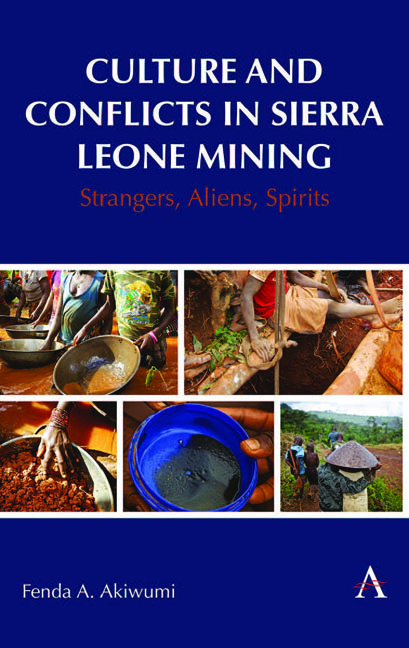Book contents
- Frontmatter
- Dediation
- Contents
- List of Figures and Tables
- Acknowledgements
- Abbreviations
- 1 Introduction: Culture in Commodity Chains
- 2 Sierra Leone’s Global Incorporation Through Mining
- 3 Cultural Difference: Policy and Legislative Dilemmas
- 4 Sacred Places: Local Ontology Meets Global Capital
- 5 Strangers, Environment, and Livelihoods
- 6 Race, Ethnicity, Class, and Gender in Mining
- 7 Between a Rock and a Hard Place
- 8 Conclusion
- References
- Index
4 - Sacred Places: Local Ontology Meets Global Capital
Published online by Cambridge University Press: 13 April 2024
- Frontmatter
- Dediation
- Contents
- List of Figures and Tables
- Acknowledgements
- Abbreviations
- 1 Introduction: Culture in Commodity Chains
- 2 Sierra Leone’s Global Incorporation Through Mining
- 3 Cultural Difference: Policy and Legislative Dilemmas
- 4 Sacred Places: Local Ontology Meets Global Capital
- 5 Strangers, Environment, and Livelihoods
- 6 Race, Ethnicity, Class, and Gender in Mining
- 7 Between a Rock and a Hard Place
- 8 Conclusion
- References
- Index
Summary
[…] superstitions were constantly interfering with my plans, but most maddening of all to a geologist was the sacred bush around the villages, into which no white person was permitted to go under any circumstances, for it is the haunt of those initiated into the secret societies. Iron and gold might lie all over the ground, but I couldn't even set my foot into this territory. (Fowler-Lunn 1938, 101)
Writings of the late Sierra Leonean scholar of African theology, Harry Sawyerr, God: Ancestor or Creator? (1970) and The Practice of Presence (1968) discuss God in traditional West African religion. He is the supreme being, creator, omnipotent, the Great Ancestor, and “a living God who can do for human beings what nobody else can” (Sawyerr 1970, 4). In Sierra Leone, the Mende calls him Ngewo, the Kono, Yataa and the Temne, Kurumasaba. Ancestral spirits are intermediaries between God and humans as ancestors remain an integral part of the family, clan, and ethnic group. There is an intricate relationship between spirituality and nature. Ceremonies involving the ancestors occur at sacred places such as forests, bushes, trees, water bodies, caves, stones, and shrines generally categorized as the sacred bush. In the traditional worldview, it is sacrilegious to violate revered places, and trees in the sacred bush should not be cut down. In precolonial times, that sacrilege was punishable by death. Today, arbitrators might levy heavy fines on the guilty (Fenton 1948). A major area of conf lict between communities and mining companies is the desecration and/or destruction of such places. Many sites of religious significance to landlordindigene communities in Sierra Leone have been lost to mining. This loss continues as extraction expands in the country. I document some examples of lost sites that are also of anthropological interest. I also discuss how government policies and laws address the sacred bush and other cultural heritage matters.
Christian missionaries observed strong religious beliefs, spirituality, and attachments to sacred places of worship among Sierra Leoneans. These proselytizers and others did not fully understand the underpinning worldview such as the important role of ancestors and responsibilities to future generations. Rituals at sacred sites were viewed as primitive, superstition, or witchcraft that ideally should be eradicated.
- Type
- Chapter
- Information
- Culture and Conflicts in Sierra Leone MiningStrangers, Aliens, Spirits, pp. 63 - 76Publisher: Anthem PressPrint publication year: 2024



